David Morrissey Talks Britannia & The Walking Dead (Plus an Exclusive Clip)
David Morrissey spoke to CBR about what appealed to him about his series Britannia, his role as the Governor on The Walking Dead and his new podcast.
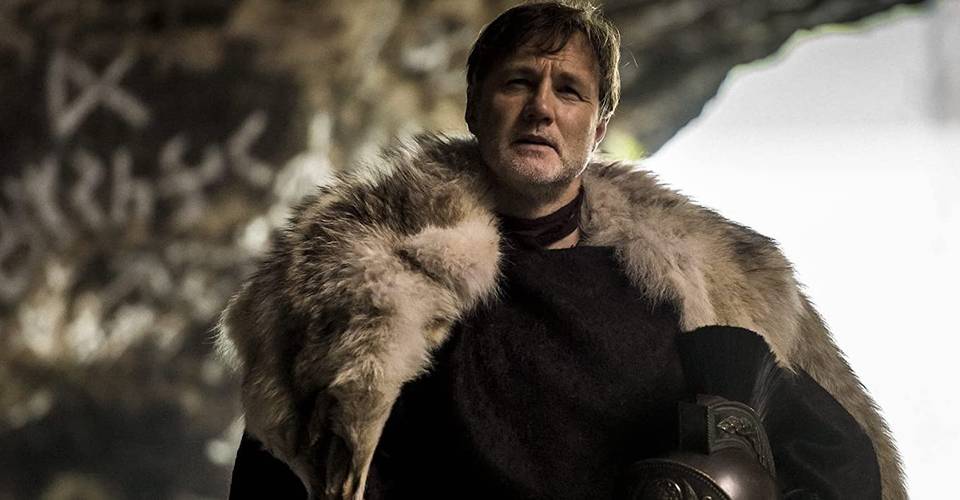
David Morrissey has had an impressive decades-long career full of versatile roles on stage and screen. While stateside, he's perhaps best known for his unforgettably chilling depiction of The Governor on The Walking Dead, he can now also be seen as Roman General Aulus Plautius on the uniquely entertaining Britannia, which is starting its second season on Epix. Aulus is a conquering hero who also knows he must win hearts and minds, not just land, in order to truly claim the wild land of Britannia for Rome, and Morrissey is captivating in the role as he brings the various sides of the General to life.
In an exclusive interview, Morrissey spoke to CBR about what appealed to him about Britannia, the parallels and differences between General Aulus and The Governor on The Walking Dead and his new podcast, Who Am I This Time. Plus, at the end of the interview, check out Morrissey in action in an exclusive clip from the first episode of Season 2 of Britannia.
CBR: Why did you want to be a part of Britannia?
David Morrissey: So even before I read anything about it, I knew it was written by Jez Butterworth…. You know, he's someone I’ve wanted to work with for a long, long time. I know him predominantly through the theater. He did a play called Jerusalem, which won many, many Tonys on Broadway and Oliviers here in the UK, and then he wrote a play called The Ferryman, which was equally lauded both this side and stateside, and he was somebody who I've always wanted to work with. So, when I knew he was writing it, that interested me, and then the period, I love the period…. It's a period of history that I've done quite a lot of research on and reading, and I was very, very interested in what his take on that would be.
And then the scripts arrived and I just loved the character. I thought the character was great. I loved the way that Jez had this respect for the period and he sort of knew what he was talking about, but he also had this irreverence for it that he was using this modern language and modern relationships and there’s something very sort of grubby and sort of visceral about it. And I loved that, and I think he brought that across fantastically in the first season as well, and continue to do. The third season, I'm in the middle of shooting at the moment and it's just a joy.
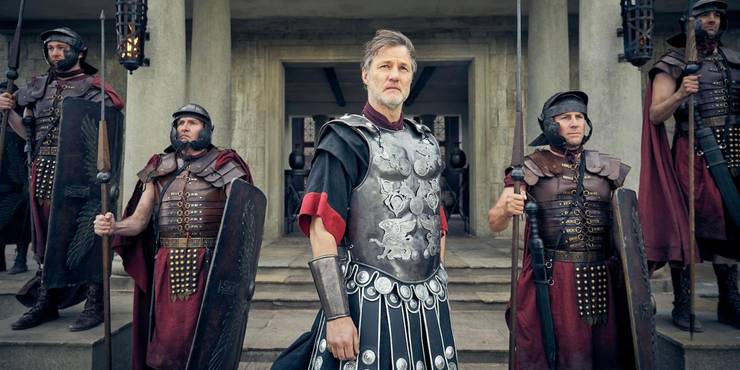
I actually found the tone of the show perplexing at first because it’s quite a mix of different things between the different tribes and the magic of the Druids and the conquering Romans. What was your take on that when you first read the script?
Well, it's interesting, isn't it? Because I've been in quite a lot of different TV shows. Something like The Walking Dead, I came in in the third season. But practically all the TV shows I’ve been in, and also all the long-running TV shows that I… enjoy watching, the first two episodes are always a little perplexing for me because I don't know the tone…. And that's true of so many shows, and certainly true of a show like this.
But because I knew the writer, and in Jerusalem, which is a play he wrote, it's very much steeped in that Druid culture…. So I knew that he could handle that. I knew that was a world that he had researched and he loved the Roman world that I knew about, so as I was reading it going on, like you, the first couple of episodes I was like, "Okay, what's going on here? What is the tone of this?" And then suddenly about Episode 3 or 4, it really then starts to deliver on all the building blocks, all the foundations that it’s put in place in the first three episodes, they start to pay off.
And I think that's true of most television now. I think most of our long-form TV shows, we have to give them at least two or three episodes before we know where they are. And then, you know, there’s TV shows that you fall in love with and then they get cancelled, which is crazy…. But thankfully we’re on our third season now, and the show has an audience. And I am really loving doing it.
You are known for the rigorous preparation you do for roles. You mentioned you had already researched the time period Britannia takes place in. Was there additional preparation that you did for the role?
Yeah, so you know the research I'd done before had been for various things like plays. I then, not long after the first season -- so I did a lot of research in the first season -- I played Marc Anthony and Julius Caesar here in London. So a lot of the research I'd done for Britannia helped me there. Aulus Plautius was an actual person…. Julius Caesar came to Britain to conquer Britain and failed. It was one of his few failures. He was defeated in battle, and so came back to Rome really in shame. You know, the fact that any leader could come back from a defeat was, as you can imagine, was really difficult….
So when Aulus was going to Britain, he knows that it's going to be a tough place because one of the greatest Roman Generals of all time had failed there. So he goes, he has this massive army. But he knows there is powers at work that are beyond physical, beyond man. The rumors that came back, the rumors that followed Julius Caesar from his defeat in Britain -- and they’re probably rumors that Julius Caesar himself put into motion because it’s helpful -- was that there was demons in Britain. There were demons that were beyond man, and that's where he became defeated, he was not defeated by any man or army or populace. He was defeated by magical demons. So when Aulus went, his men were absolutely scared because they thought they were going to encounter these magical beings.
And the Druids have that element. The Druids do have this, they feel like this otherworldly, dangerous people who are in touch with this mystical place called the underworld. So there are devils there, there are people who [have] powers beyond our ken. And I think… what Jez taps into in this show is the other, the sort of magical side, the psychological side. The fact that you're going to a place. If you look at the Romans as great soldiers, great army, ruthless conquerors, and they’re going to a place which is beyond, it's somewhere else, it's not inside their comprehension. That, I think, Jez brings out in such a wonderful, magical way with the Druid side of the story.
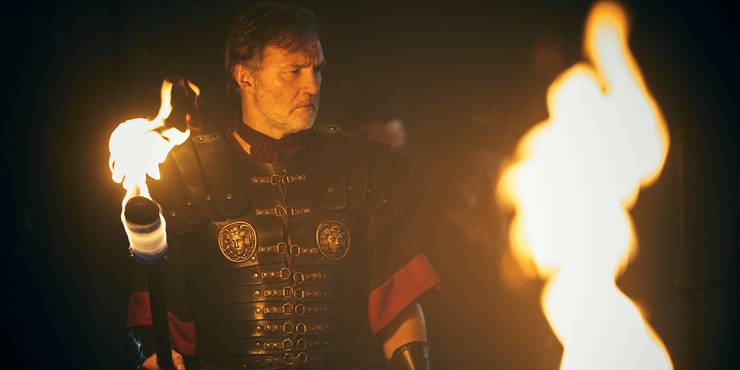
In America, as you know, you made a huge impression playing the Governor on The Walking Dead, and in certain ways, I saw some parallels between the Governor and your character in Britannia in the first couple of episodes. Were there parallels that were noteworthy to you at first?
Well, yeah, I mean that idea of man in authority is really important. I think there is a sense of a parallel between them in that sense…. I mean, I wouldn't say that the Governor was a conquering person. He was someone who set up his own enclave and he was sort of not interested in going beyond that, he wanted to stay in Woodbury. Obviously eventually he had to go and fight Rick and his men in the prison.
But the General, Aulus, is somebody who’s part of a conquering army, a conquering world, a conquering country. That's how the Romans built, so he would not in any way have felt like individually in the wrong place. He's in a world that has a strong tradition to it along lines that people know about. He's in a very secure place, whereas the Governor, there's been this zombie apocalypse, it's a new world. It's a world where they're rewriting the rule book. It's a sort of Wild West, if you like. Whereas for the Romans, they have been the conquering force for centuries, so they were living and existing in a very definite and ordered world, and the Governor, order is gone. So, there are parallels, but there's very distinct differences as well.
Both Britannia and The Walking Dead seem to shoot in these incredibly harsh environments. Was there one setting that was more challenging to shoot in than the other?
Well they all come with their challenges, and also what's the biggest challenge in all these things usually is the weather. We filmed in Britannia, I think we went from May till December. And when you see the opening of Britannia, you see me just about to set out for Britain. And we shot that scene in the Czech Republic probably about the nineteenth of December, and it was freezing. It was a night shoot. We had to be wet, it was supposed to be raining. It took probably three or four nights to film. And I’ve never been cold [like that], I thought I was going to die…
And, of course, we as the actors were in our costumes and all the crew are in their North Face jackets and all sort of wrapped up. That is the most uncomfortable I've ever been on any film set. And so I remember that. And also, we shot that at the end of the shoot so everybody else had gone home. So it was really just me and Hugo [Speer, who plays Lucius,] and a couple of the other actors. [Laughs] It was me texting everybody back home saying you don't know how lucky you are that you're not in this scene. So that's why I remember [it].
All the challenges tend to come with the weather and the elements from where you are. So, in Georgia [for The Walking Dead] it was the heat and the humidity, as everybody knows down there. That's tough. And in Britannia it was the cold. I've recently just been filming in Malaysia, I did it last year, but the thing I filmed is called The Singapore Grip -- that's just come out [in the UK] – and that again was just torrential rain, the hot rain, it was monsoon conditions, so you're in a very different place then as well. But if I’m honest, I love it. I love all that. I love the fact that my work is challenging me, it's asking things of me. It can be uncomfortable, but you know, it's also very rewarding both financially but also emotionally, so you know I never complain about those things.
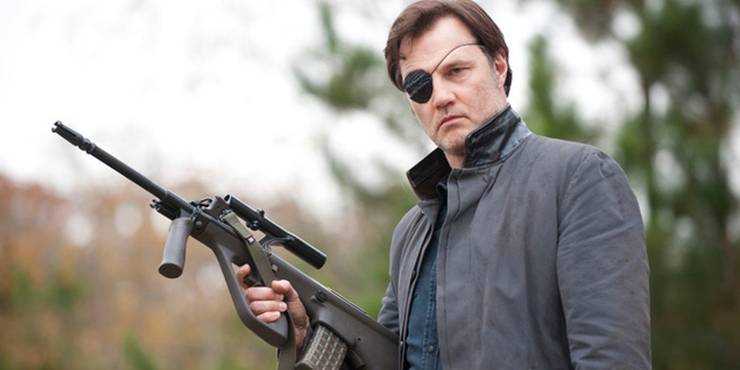
Before I let you go, I have to ask about the new podcast you recently started called Who Am I This Time. What’s it about?
So, the podcast Who Am I This Time is where I interview actors about one role that they've got. And why I set it up was because when I was growing up, I wanted to be an actor but there were no actors in my life. There was nobody really in my life who was in the arts, so there was nobody I could go to and say, "Look, how do you become an actor? What do you do? If I do get a job, how does it work?" So I wanted to talk to actors about their experiences of being in the job. How they got the role, the type of preparation they did for the role and then what it was like for them on set and beyond. What was it like once it comes out in the cinema or on the TV and suddenly people are [recognizing] you in the street.
I wanted to know what those experiences were, and I’ve been lucky enough to talk to people like David Harewood about Homeland, Derek Jacobi about I, Claudius. I also talked to Lawrence Gilliard Jr. about The Wire. I talked to Alan Cumming [in] the first episode. I talked to him about the Emcee in Cabaret, which he did on Broadway. I mean, he just stormed Broadway with that role and it changed his life. And he talks very openly about how wonderful that was but also about how frightening and slightly how he lost it in that sort of adulation for a while. It's a very heady mix that can happen to an actor when they suddenly are in a role that everybody is loving, everybody is adoring, and you have to deal with that. There's not a lot of manuals about how to deal with that level of adulation and fame, and Alan talked about it, I thought, very openly and honestly about how he came to terms with that.
That sounds really fascinating. Where can people find it?
So it's on Apple, it's on Spotify, it's on wherever you get your podcasts….
Season 2 of Britannia stars David Morrissey, Nikolaj Lie Kaas, Eleanor Worthington-Cox, Mackenzie Crook, Annabel Scholey and Julian Rhind-Tutt. Episodes airs weekly on Epix starting Sunday, Oct. 4.
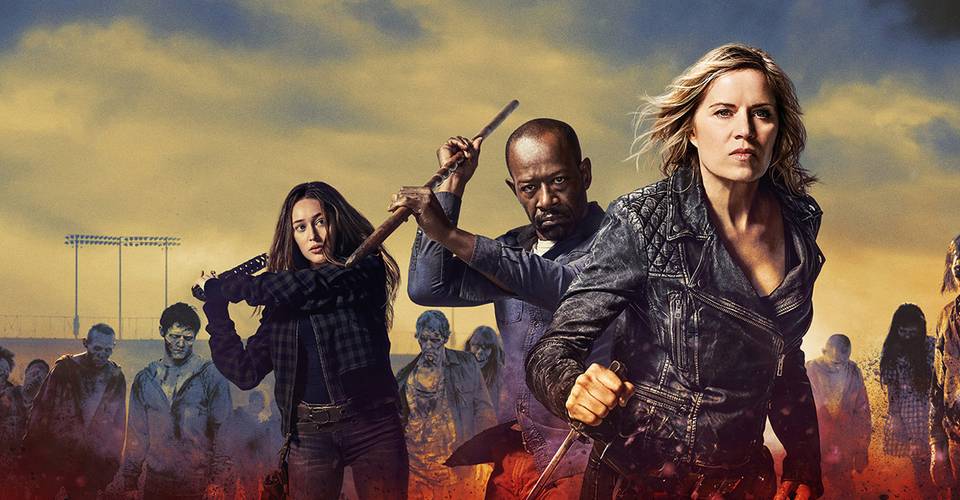
No comments:
Post a Comment